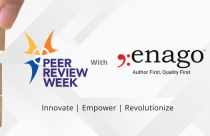Trust in Peer Review: From the Eyes of Authors, Reviewers & Editors (Part 1)

Peer review is one of the most crucial processes in research publishing. Different sections of the academic community view it from different perspectives. Authors see it as the major checkpoint in their journey of manuscript acceptance and consequent publishing. On the other hand, publishers consider it essential for publishing high quality and novel research, thereby maintaining the quality of the journal.
Regarding the publishers point of view, we have a webinar on Wednesday (23rd September) wherein members of a few renowned publishing groups will come together to discuss how they strive to maintain trust in the peer review process. Don’t forget to register for that! But for now, let us see how researchers think about maintaining trust in the peer review process, both from the point of view of journal authors and reviewers.
How Do You Interpret “Trust in Peer Review”?
Trust forms the basis of any relationship, be it that between an author and a reviewer or between an author and a publisher. Now the most important question here is, how is “Trust in Peer Review” interpreted among the key stakeholders of the academic publishing industry?
“As a journal editor, I believe that the double-blind peer review system is generally highly trusted and relied upon by scholars. The more an academic journal can uphold the integrity of the review system, the better reputation the journal will acquire. Moreover, authors are usually very appreciative of concrete and in-depth comments even if their articles are rejected or asked to make major revisions. Reviewers can be critical, but shouldn’t be abusive. When the comments become overly judgemental, the more constructive intention of the peer review system can often be lost. Hence journal editors may need to be mindful of this (without distorting the meaning of the reviews) when communicating the results of peer reviews to authors.”
Dr. Ming-yeh Rawnsley
Research Associate, Centre of Taiwan Studies, SOAS, University of London and Editor In Chief at International Journal of Taiwan Studies
Almost 80% manuscripts get rejected during peer review. Don’t let your manuscript be one of them. Avail Enago’s professional Pre-Submission Peer Review services. You never know you might get some additional discounts on the occasion of the Peer Review Week! Do check it out!
“Trust in peer review is at the heart of the current academic publication
system. Although academics may sometimes be disappointed by the reviews provided, especially when being rejected or receiving reviews that lack quality, peer reviews, if done well, represent an essential mechanism of quality assurance for developing an area of academic study. For that reason, reviewers need to realize their responsibility to provide the highest-quality evaluations of manuscripts in order to ensure their own quality as well as their contributions to the progress of the field. Often, the quality of journals can be determined by its reviewers. For editors, peer review is essential in the current era of specialization, in which nobody can be an expert in every field. Thus, peer reviewers and editors’ trust in them are critical to affording editors clarity about the potential of a manuscript under evaluation. In sum, although nobody may be completely or even mostly happy with the current state of the peer review process, because no better system exists at present, trust in peer review is essential.”
Dr. Michael Prieler
Professor at Hyllam University, South Korea and Visiting Professor at City University of Hong Kong
Why Should You Trust?
“Peer review has an important role in the validation of scientific information and data that are expected to be published in academic journals. In this sense, trust in peer review is structured on the academic integrity (e.g. honesty, morals, respect, etc.) of those who make up the committee. Academic integrity is based on internal codes of conduct (e.g., ethical behavior, avoiding conflicts of interest, principles of dignity, benefaction, autonomy and justice), and is built on the duties and responsibilities of its members. It also seeks to avoid misconduct in research such as plagiarism, fabrication and falsification of data obtained as a result of scientific research. Likewise, the construction of trust towards peers is generated from the commitment assumed by the members of the committee to ensure that the quality of academic production is adequate and generates benefits, not only towards the academic community or discipline that builds knowledge but to the community in general.”
Dr. Waleska Sanabria-León
Professor at Pontificia Catholic University of Puerto Rico
“Trust, the most breakable and unmendable item, is a key component
of research. I am involved in the peer review system as a reviewer and, naturally, a reviewee. Every time I evaluate a paper, I start with the premise that it is worth reading. I trust talent, intelligence and integrity, and I know that they did their best. I assume that the researchers involved spent much of their valuable time gathering data and writing ideas up. Thus, I owe them to do my best to improve the manuscript. Never did I find a bad human being trying to make a glorious future for themselves out of thin air. If I failed a paper, it was because of some shortcomings in the expertise of the author, but never because of malpractice. Luckily, most of us are dignified individuals who work with the only intention of benefiting mankind and our field with hours of hard work. I trust that, when my papers are sent for review, reviewers act in the same respectful manner. It feels good to be part of a cycle of mutual trust, and to pass these beliefs to my students. Mutual trust makes it worth to belong to the research world and is the only path towards human progress.”
Dr. Montserrat Sanz Yagüe
Professor at Kobe City University of Foreign Studies,
This is the first part of the article. In the second part, we have discussed the issues related to peer review process/models that affect both authors and reviewers adversely and might need modifications.










